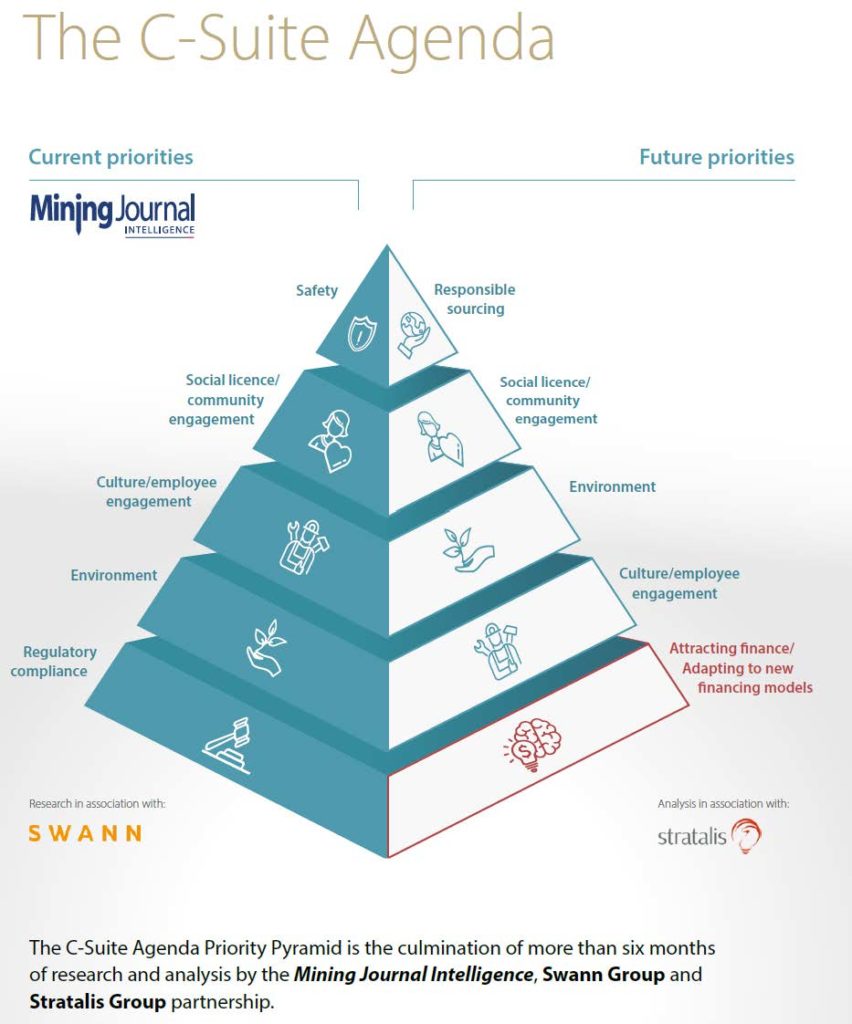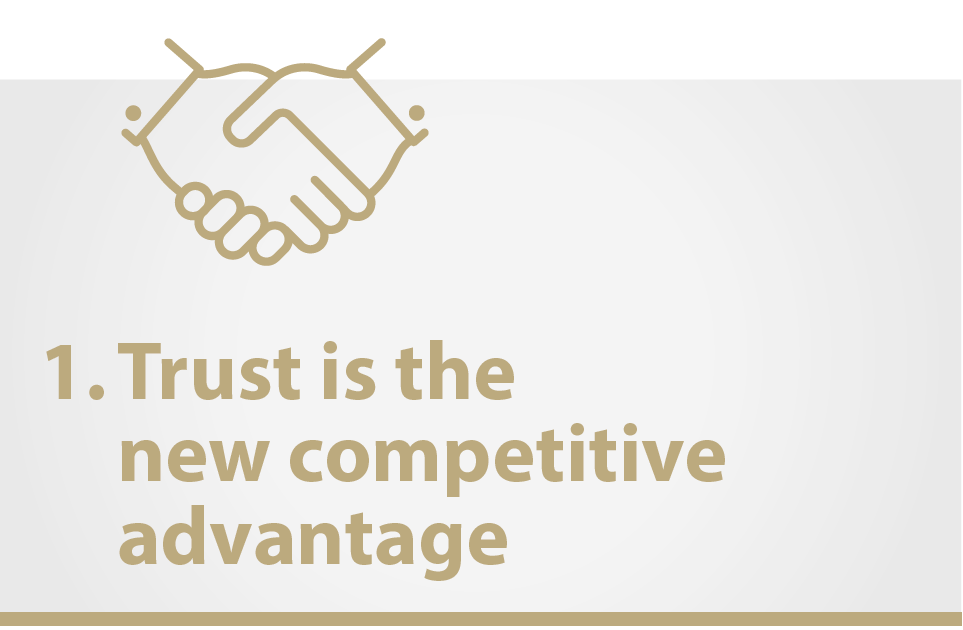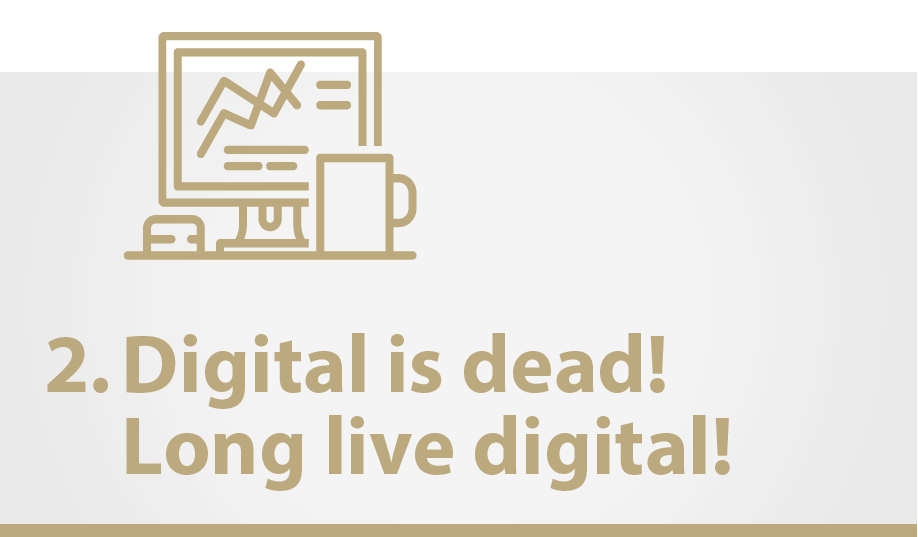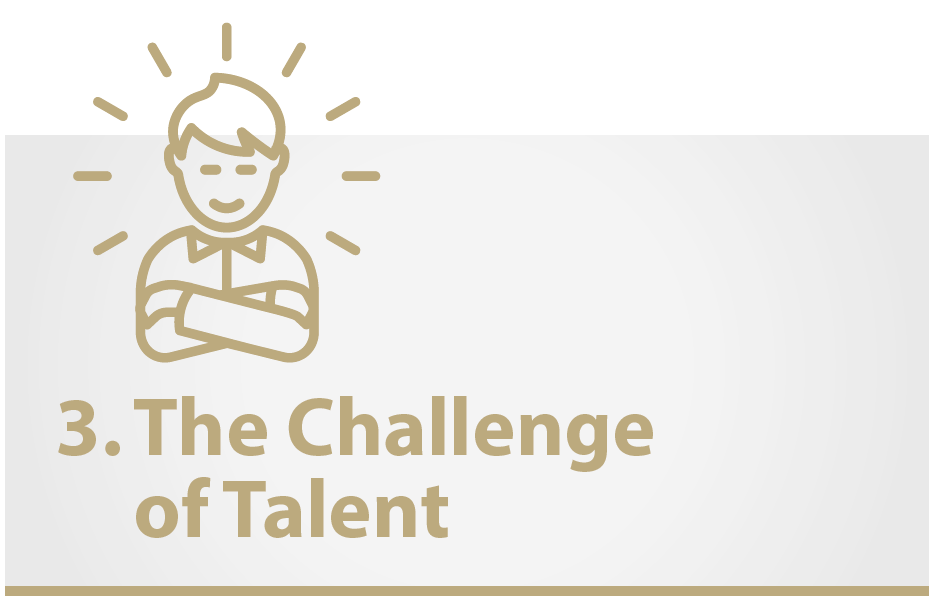The inaugural CEO’s Agenda explains why “Trust is the new Advantage”, “Talent Matters” and how the “New Digital” will drive who wins and who falters in the decade ahead.
After 6 months of research, Stratalis Consulting presents the CEO’s Agenda, part of the Global Leadership report, in partnership with Mining Journal. The report, based on interviews and independent research with dozens of CEO’s and hundreds of executives from top miners, OEM’s and investors, outlines what matters most to CEO’s and they believe should matter to their successors.
In addition to in-depth interviews with leaders, our report also touches on three key themes (Trust, Digital and Talent) that bubbled to the surface and premieres our “Priorities Pyramid”; a future-focused lens on what keeps CEO’s up at night. Read on for an excerpt from the report.

Our reports also introduces our Priorities Pyramid; a future-focused lens on what keeps CEO’s up at night.
THE C-SUITE AGENDA
A global pandemic has changed the nature of work. Tailings dam failures have become existential threats to individual companies and the industry. Activist investors have emerged to drive sustainability agendas. Around the world, populist leaders are eager to cast the industry as scapegoats for societal ills. A long-awaited recession is underway and uncertainty continues to build within the largest economies and consumers of minerals demand. How are CEOs responding to these turbulent times and what is the path to success across a multitude of present and future challenges?
Our 2020 Global Leadership Report: The CEO’s Agenda, has verified in definitive terms what the industry and the ecosystem have been sensing for some time: in these transformational times, if anything is certain, it is that nothing is certain at all.
Through our in-depth discussions with our panel of leading C-Suite executives, supported by a global survey with leaders from hundreds of mining companies, OEM’s, service providers and investors, three consistent themes around what matter to CEO’s today, and what will matter in the future, emerged:

Our discussions with CEO’s highlighted the importance of “Trust” as a critical element for sustainable success and the differentiator between companies that would flourish or struggle.Successfully navigating all five of our top CEO Agenda elements, ranging from Safety to Employee Engagement, on a path from business-stoppers to success-drivers relies on a social contract based on Trust.
This challenge of trust has been increasing in prominence in the last few years. Examples of this vary from miners struggling to build trust with communities and regulators through GHG reduction efforts, to attempts to attract talent through investments in safety and digital programs. A particularly interesting development at the forefront of the CEO’s Agenda are efforts to build trust with investors, like the Church of England, through initiatives based on transparency and shared guidelines, such as those spearheaded by International Council of Mining and Metals (ICMM).
What has increased the prominence of Trust in our 2020 report? Many factors play into this, at both the macro and industry level. Globally, new technologies have come into their own, with social media enabling the rapid mobilization of NGO’s and communities that demand transparency from industries that they view with suspicion. Unlike in years past, politicians and governments on both sides of the aisle listened and have taken aim at corporations for issues ranging from privacy to environmental policy to wealth and taxes. Closer to home, shifting investor priorities, ranging from the rise of millennials embracing ESG investing as a lever of societal change to increasing shareholder and fund activism by more established bodies, have led Boards to pressure CEO’s to pivot to their demands. Crowning these, at the industry level, a series of global tailings dam failures and indigenous community missteps have contributed to an increasing awareness by CEO’s that the playbook for success is being rewritten in months rather than decades and that Trust will be a necessary element to succeed.

Despite investments from mining companies, OEM’s and consultants, the long-awaited “Digital Revolution” has not produced promised results. While there is no question in the minds of our respondents that the future is digital, CEO’s and executives indicate both a frustration with and an acknowledgment of, the importance of technology, innovation and digital efforts.
Many mining executives viewed the past few years as a disappointment in terms of realizing results from digital and technology efforts. While the recent reshuffling of innovation, technology and digital leadership positions across most, if not all, of the major mining companies is evidence of this wavering confidence, our executive panels did indicate a general belief that the future will require a technologically ‘different’ mining company. Those that focused on this topic indicated that that the winners of tomorrow will successfully operate in a more autonomous, mechanized and digital manner, invest consistently in thoughtful technology initiatives and navigate cooled investor enthusiasm towards transformation through global recession and potentially disappointing initial outcomes.
In the past, initiatives such as machine automation to reduce costs were the focus of technology development efforts. In contrast to past down-cycles, which would have seen these types of operational innovations shuttered as willingness to invest CAPEX faltered, our research indicates that this time around, executives are instead pivoting their efforts. Digital investments have risen to the forefront, specifically those that focus on big data and the convergence of it into systems to address “human” challenges: Safety and License to Operate challenges through tailings monitoring and GHG mitigation efforts; the Challenge of Talent through capability building and worker enhancement initiatives and Resolving Safety Issues, especially due to COVID-19.
As such, rather than slowing down, recent efforts indicate that many companies are accelerating aspects of their digital roadmaps as they redefine what is an “Essential Worker,” not only on site, but also in the home office. As an added benefit of no small measure, data analytics and machine learning may be a powerful tool in managing exploration shortfalls and the emerging supply crunch and improving operating performance, traditional challenges that are table-stakes for every mining company.
Digital still matters, but balancing the promise of technology with the value of humanity is considered increasingly important and advancements that build trust by both heightening human potential and transforming the enterprise are viewed at a premium.

This year’s survey highlights the absolute acceptance by CEO’s, OEM’s and others that the mining industry, once inward-looking, no longer exists in a bubble. No area is more reflective of this than the challenge of recruiting, retaining and reskilling Talent. In a socially considerate, transparent and digital post-COVID world, finding employees with needed skills that prefer to join the mining industry is becoming a bottleneck to transformation.
Mining CEO’s are seeing this as more than just a temporary issue, but as the key to resolving a significant future risk. While finding new graduates to join the industry is needed to amplify transformational capabilities, especially in digital and technology areas, the lack of new talent also impacts the Trust that society has in the sector. Mining has developed a reputation for being unsustainable and doing more harm than good; values that are contrary to the beliefs of many millennials. In response, mining CEO’s view the recruiting of young, diverse talent that reflects the broader makeup of society as an important lever to not only changing this perception but to creating real meaningful growth for the industry. As evidenced by other industries such as Aviation, Heavy Duty Equipment and Advanced Manufacturing, this is exacerbated by the fact that many of the current workforce are unwilling or unable to be upskilled to work in a digital environment.
As is clear, Talent is a critical enabler for mining companies to address the Digital Transformation and Trust challenges that they face; one that CEO’s indicate will require industry-wide collaboration and messaging to be successful.
To learn more about how Stratalis helps leading companies to set dynamic strategies in uncertain times, contact George Hemingway, Head of Practice at george.hemingway@stratalisgroup.com
